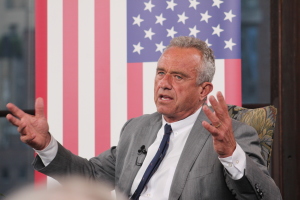Aaron Reynolds: Beyond Traditional Sunday School, Children's Ministry That Prevails
“The children’s ministry is realizing that there is a way of teaching kids that goes beyond the traditional Sunday school.”
According to Aaron Reynolds, a children’s ministry expert, children’s ministry can be evangelistic, powerful, and full of relevant and creative teaching.
On June 21, 2005, Reynolds spoke with the Christian Post about his experience as an author, performer, and producer in children’s ministry and what it takes for the ministry to thrive.
What are some of the trends you see in children’s ministry today?
The children’s ministry is realizing that there is a way of teaching kids that goes beyond the traditional Sunday school we grew up with. There is a way to meet kids where they are and to excite and impassion them with creativity and variety. There is a way to address them as kids, as who they really are.
I’ve seen a lot of churches with those light bulbs going on saying, “Wait, there is a way of doing children’s ministry in such a way that it doesn’t just exist from weekend to weekend and reach kids that come every week.”
A children’s ministry that prevails not only makes kids want to be there but makes them want to bring their friends and parents there. That form of ministry is evangelistic, powerful, and full of relevant and creative teaching, rather than just a sustained kind of teaching that never grows beyond the same ten kids that show up every week.
Children’s ministries struggle to get there sometimes.
As I traveled around the country, consulting and training those in children’s ministry, one of the common things I saw was the growing pains of small churches in becoming a medium sized church. The small churches did not know how to make the transition out of their small traditional church ways to a way that can really affect a larger group of kids. The medium sized churches are doing the same as they try to grow to a hundred kids in their ministry, but the same tools and methods don’t work anymore. So how do we make this transition? What I’ve been able to do and trying to do is to help them make that transition.
Are these trends showing up across the nation, crossing over denominations?
Yes, I do see it. In a lot of ways, this movement has nothing to do with denomination. It’s about the Bible and about creating a new way of teaching whatever it is that each individual denomination or each individual church chooses to teach.
A phrase I like to use is “teaching through the back door.” It’s the idea that the best teaching happens in a way that the kids don’t even know they’re learning. They just love being there.
I think it is a movement and a way that has little to do with denomination and more has to do with a common desire among all church ministries to prevail and to take this mission that Jesus gave us seriously.
What are some of the key components of a successful children’s ministry?
I’m hesitant to say that there is a one-size or one-solution-fits-all type of mentality for that. I think all ministries face their own challenges, their own unique issues, and their own unique set of circumstances. For example, specific things like how many volunteers and space they have and how much their pastor considers children’s ministry a vital part of their church, all affect the shape of an individual ministry.
A church needs to define a clear set of values that direct the way it goes forward. I think that’s one common thing that a more traditional church struggles with, but it can make all the difference in the world as to how effective they are.
If you look at the Bible, Jesus did it all the time. He didn’t just know what he was doing – he was very verbal about it. He defined it. He laid it out in words, repeatedly and constantly defining what he was there to do, what the mission was, and what success and failure looked like. As children’s ministries, we should do that as well.
Beyond a really strong set of values that help define the ministry, the idea of talking to kids “where they are” is critically important. That is a really important thing to be taken seriously. We sometimes think that we get to talk to kids however we want because we deserve to, but the truth is, in a kid’s mind you have to earn the right to be heard by them. The way you do that is by acknowledging and addressing where they are. It’s about “being real.” I think authenticity has a lot to do with it.
Your creative ideas seem faith-inspired. What kind of spiritual disciplines play a key part in receiving inspirations for your creative works?
I think they are faith-inspired in so much as God gifts us and wires us in a very specific way. It's easy to say, "Okay, so we only look in church type of places for inspiration." I think the spirit finds inspiration from everywhere to feed me. As a creative teacher of kids, it’s my job to make sure I immerse myself in the culture.
If it’s my job to reach kids, obviously prayer and other spiritual disciplines are a key part of that, but I have to take it beyond those common disciplines and have to do my due diligence of being practical and say, “Okay, how do I immerse myself in kids’ world so that when I stand in front of them, I am authentic.”
I want to make sure that I really know their world and I’m not just talking a bunch of jibber jabber that makes them think that I’m talking one thing and I don’t really know them at all. That’s immediately inauthentic. So I think my job is to constantly immerse myself in the culture and be aware of what’s going on, good or bad.
If I just keep myself in a bubble and never let myself be aware of what’s in the culture, I not only can’t use what’s there that’s good, but not cite effectively what’s not. That’s a very important part of being inspired and using creativity. That’s what Jesus did all the time. He knew the culture, he hung out with the good and the bad, and he used it all for the message he needed to say.
What do you feel about the job of Christian adults to protect Christian children from secularization?
I think it’s our job to shine lights on things in the world, both good and bad. Some people might disagree with me on that. They might say, “I don’t want my children to know that this exists or is out there.”
I would say information is good and should be age appropriate. You’re not going to talk to kindergarteners about drugs, purity, and relationships. But when the time is appropriate you should provide the kind of preventive knowledge that says, “let’s acknowledge this stuff exists and call them what it is, which is not God-honoring, not righteous, and not cool, and here’s what God says is right, God-honoring, and is cool.”
That kind of approach in my mind is awesome because Satan wants us to keep it all in the dark. Sometimes he does it under the guise of making us think we’re protecting, but I think great protection is getting out to the light in discerning age-appropriate ways and drawing attention to what God has to say. We sometimes err on the side of not letting the kids know what’s really out there because we’re fearful of it. I think fear can go away somewhat when we acknowledge it and call it what it is and bring it out of the shadows and into the light. That would be my point of view regarding protecting our kids in a secular world.
Aaron Reynolds, who previously served as a producer and artistic director of Promiseland, the Children’s Ministry of Willow Creek Community Church, has written and produced over 200 creative lessons, drama scripts and videos for kids and families. He travels around the world helping equip churches to use the creative arts more powerfully in their children’s ministries.
Reynolds is also known for his innovative and intensive brand of workshops called Master Classes, a unique style of training that helps strengthen the up-front skills needed by children’s ministry leaders. He can be approached about his consulting and training services through his website at www.creativekidsministry.com.
He is the author of several children’s books including The Tale of the Poisonous Yuck-Bugs, The Nineteenth of Maquerk, and Breaking Out of the Bungle Bird, which have been released this month. Chicks and Salsa is to be released in October. He is a father of a seven-year-old son and a 4-year-old daughter.




























